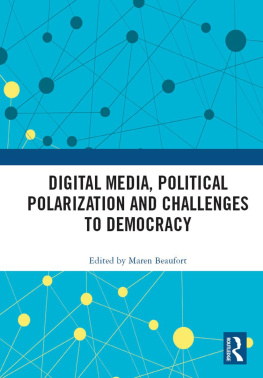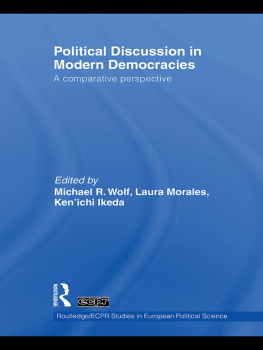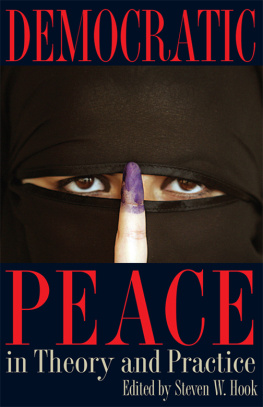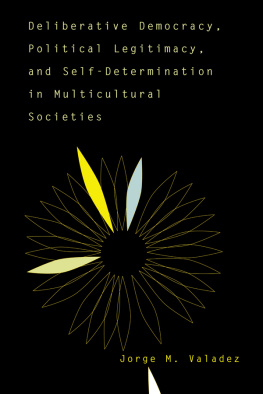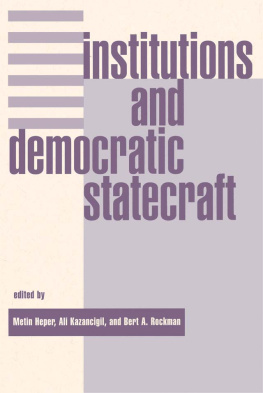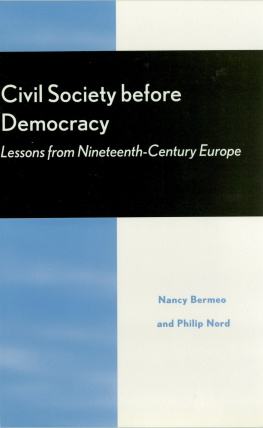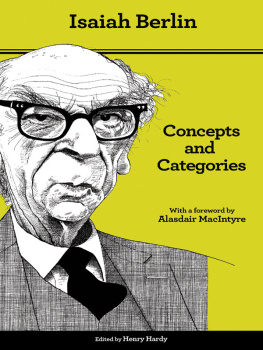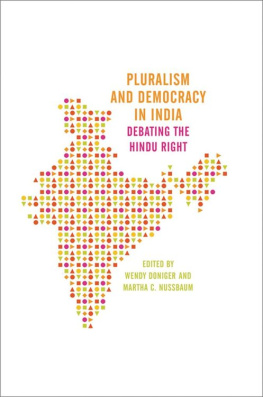Challenges to Democracy
Isaiah Berlin, philosopher and historian of ideas: born Riga, Latvia, 6 June 1909; Lecturer, New College, Oxford, 19328, Fellow 193850; Fellow, All Souls College, 19328, 195066, 197597; Chichele Professor of Social and Political Theory, University of Oxford, 195767; FBA 1957; Knight 1957; Vice-President, British Academy, 195961, President 19748; President of Wolfson College, Oxford, 196675; Professor of Humanities, City University of New York, 196671; OM 1971; married 1956 Aline Halban, nee de Gunzbourg (three stepsons); died Oxford, 5 November 1997.
Works include Karl Marx: His Life and Environment (1939; fourth edition 1978), The Hedgehog and the Fox (1953), The Age of Enlightenment The Eighteenth-Century Philosophers (1956), Four Essays on Liberty (1969), and the following volumes edited by Henry Hardy: Russian Thinkers (1978, co-edited with Aileen Kelly), Concepts and Categories: Philosophical Essays (1978), Against the Current Essays in the History of Ideas (1979), Personal Impressions (1980; 2nd, enlarged, edition 1998), The Crooked Timber of Humanity. Chapters in the History of Ideas (1990), The Sense of Reality: Studies in Ideas and their History (1996), The Proper Study of Mankind: An Anthology of Essays (1997, co-edited with Roger Hausheer), The Roots of Romanticism (1999), The Power of Ideas (2000) and Three Critics of the Enlightenemnt: Vico, Hamann, Herder (2000).
First published 2000 by Dartmouth Publishing Company and Ashgate Publishing
Reissued 2018 by Routledge
2 Park Square, Milton Park, Abingdon, Oxon OX14 4RN
711 Third Avenue, New York, NY 10017, USA
Routledge is an imprint of the Taylor & Francis Group, an informa business
Copyright Raphael Cohen-Almagor 2000
All rights reserved. No part of this book may be reprinted or reproduced or utilised in any form or by any electronic, mechanical, or other means, now known or hereafter invented, including photocopying and recording, or in any information storage or retrieval system, without permission in writing from the publishers.
Notice:
Product or corporate names may be trademarks or registered trademarks, and are used only for identification and explanation without intent to infringe.
Publishers Note
The publisher has gone to great lengths to ensure the quality of this reprint but points out that some imperfections in the original copies may be apparent.
Disclaimer
The publisher has made every effort to trace copyright holders and welcomes correspondence from those they have been unable to contact.
A Library of Congress record exists under LC control number: 99055687
ISBN 13: 978-1-138-72661-1 (hbk)
ISBN 13: 978-1-315-19132-4 (ebk)
This book aims to tackle the intricate question of how democracies should deal with intolerance and political extremism. It brings together some contributions of leading scholars that reflect on this question. The deliberations will enrich the interested public with insights and will provide much food for thought.
Most of the essays were presented at an international conference entitled Ethics, Law, and Communication in an Era of Political Violence and Extremism: An Examination of the Boundaries of Liberty and Tolerance in Liberal Democracies. The conference was held at the University of Haifa on 2831 January 1997.
I wish to thank my colleagues at the University of Haifa who shared the same concerns and welcomed the initiative. Special gratitude is expressed to the people who assisted me in various ways in the editorial work of this volume: Dean of the Social Science Faculty, Baruch Nevo; Dean of the Research Authority, Aaron Ben-Zeev, and my loyal and dedicated personal assistants, Dafna Gold-Malchior, Keren Eyal, Nathalie Pravedna and Diane LeCover. Without their good will and hard, skilful work this volume could never be assembled. I am also most thankful to the Fulbright Foundation for its generous support.
A former version of Freedom of Speech: From Privilege to Right appeared as a pamphlet published by The Institute of United States Studies, University of London (1998). In turn, Reflections on Administrative Detention in Israel: A Critique is an updated and rewritten version of an essay that was published in New York International Law Review ; Vol. 9, No. 2 (1996), pp. 125. I am most grateful for permission to use these articles. A Hebrew version of Democracy and Multiculturalism appeared in R. Cohen-Almagor (ed.), Basic Issues in Israeli Democracy (Tel Aviv: Sifriat Poalim, 1999). Gratitude is granted to Sifriat Poalim for permission to publish its English version.
The book is dedicated to Isaiah Berlin. Sir Isaiah cared a great deal about Israeli democracy and was involved in its public life in many ways. He also was a kind supporter and a personal friend. I will cherish his memory all my life.
RAPHAEL COHEN-ALMAGOR
I. Preliminaries
Political extremism and cultural chauvinism are growing concerns in liberal democracies. All around the globe we find groups that exploit democratic mechanisms to their advantage, in a way that undermines the liberal foundations. We also witness men who wish to elevate cultural norms above the law, often in order to exploit and harm their women in one form or another. This book addresses these challenges and seeks to formulate some meaningful solutions that might help democracies tackle these troubling questions.
During the past two decades, Israeli democracy has found itself more and more in need to address the problem of its enemies from within, i.e. political extremists attacking the delicate framework of democracy. One most significant event occurred outside its borders but constituted a milestone in the history of Israeli political extremism because it had a bearing on the assassination of Prime Minister Yitzhak Rabin. In November 1990 Rabbi Meir Kahane was murdered in Brooklyn. From his immigration to Israel in 1971 Kahane brought about a new phase of political extremism in the history of modern Israel. The term Kahanism, used to capsulate his ideology, political platform, and violent actions, is the most extreme religio-political phenomenon the country has known since its establishment in 1948. In my first book I tried to formulate a theory that prescribes boundaries to liberty and tolerance, and I closely examined the Kahanist ideology and the struggle of the Israeli establishment against that phenomenon. I chose to conclude the book with the following sentences:
In November 1990 Kahane was murdered in New York City. I was deeply shocked and disturbed by this. No matter what we may think about the man, his ideas and his political platform, I was disgusted by the way his life came to an end. I also felt deep sorrow, sorrow about the murder and for the likely consequences that were (and still are) to follow. Since the day of Israels independence no assassinations of political leaders have occurred in Israel, and I hope this murder will not open a new phase in the political discourse


